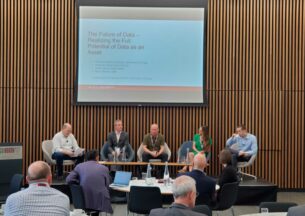Rebecca Willett is a Professor of Statistics and Computer Science at the University of Chicago and Faculty Director of AI at the Data Science Institute. Her research is focused on machine learning, signal processing, and large-scale data science. She completed her PhD in Electrical and Computer Engineering at Rice University in 2005 and was an Assistant then tenured Associate Professor of Electrical and Computer Engineering at Duke University from 2005 to 2013. She was an Associate Professor of Electrical and Computer Engineering, Harvey D. Spangler Faculty Scholar, and Fellow of the Wisconsin Institutes for Discovery at the University of Wisconsin-Madison from 2013 to 2018. Willett received the National Science Foundation CAREER Award in 2007, is a member of the DARPA Computer Science Study Group, and received an Air Force Office of Scientific Research Young Investigator Program award in 2010. Willett has also held visiting researcher or faculty positions at the University of Nice in 2015, the Institute for Pure and Applied Mathematics at UCLA in 2004, the University of Wisconsin-Madison 2003-2005, the French National Institute for Research in Computer Science and Control (INRIA) in 2003, and the Applied Science Research and Development Laboratory at GE Healthcare in 2002.
Research
Focus Areas: Signal Processing, Machine Learning, Data Science
My research interests include signal processing, machine learning, and large-scale data science. In particular, I have studied methods to leverage low-dimensional models in a variety of contexts, including when data are high-dimensional, contain missing entries, are subject to constrained sensing or communication resources, correspond to point processes, or arise in ill-conditioned inverse problems. This work lies at the intersection of high-dimensional statistics, inverse problems in imaging and network science (including compressed sensing), learning theory, algebraic geometry, optical engineering, nonlinear approximation theory, statistical signal processing, and optimization theory. My group has made contributions both in the mathematical foundations of signal processing and machine learning and in their application to a variety of real-world problems. I have active collaborations with researchers in astronomy, materials science, microscopy, electronic health record analysis, cognitive neuroscience, precision agriculture, biochemistry, and atmospheric science.














